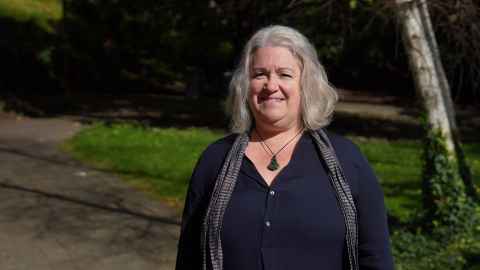The ‘Mrs P’ case highlights the crisis in our Family Court
17 January 2024
Many women and children, whose true claims of abuse are disbelieved or dismissed, never get their High Court victory.

Trigger warning: This opinion piece contains information of a sensitive nature including descriptions of violence and harm that may be triggering for some people.
Opinion: Eight years after she was bullied in the Family Court, bankrupted, and wrongfully convicted of perjury, “Mrs P”, whose real name is permanently suppressed, has finally been vindicated.
Mrs P’s trip through the justice system was torturous. In 2007, at the behest of her ex-husband, police searched her home for property he alleged she “stole” when they disagreed about the division of relationship property. She was also convicted of assaulting him after a “physical altercation”, even though she had marks on her neck from where he knelt on her throat.
In Family Court, Mrs P offered ACC records showing she sought treatment for sexual and physical abuse Mr P inflicted during their marriage. The records indicate she suffered from anxiety, nightmares and flashbacks because he beat and raped her. Mrs P testified he would strangle her to coerce her into having sex.
The records contained deeply private information that was irrelevant to the litigation, which Mrs P redacted to protect her privacy. She redacted the records openly, and was candid about the alterations in her testimony. Mr P pounced on these alterations, adopting a legal strategy to paint Mrs P as a perjurer and himself as a victim of her duplicity and false allegations.
A series of Family Court judges seized on Mr P’s strategy, characterising Mrs P as an “unconscionable” liar and expressing sympathy for Mr P’s suffering due to her accusations.
The judge who presided over her trial, Peter Callinicos, badgered her so badly on the witness stand she became distraught and burst into tears. He inexplicably insisted that, when she sought counselling, she did so based on “false statements”, with no explanation of why someone would “fabricate” sexual assault to get confidential counselling while still married to the perpetrator.
Judge Callinicos also castigated her for disclosing Mr P’s physical and sexual violence to close friends, police, and health professionals, as if it were self-evident that protecting Mr P’s reputation should have taken priority over her accessing support and in stark contrast to Aotearoa’s official family-violence policy, which encourages victims to reach out for help.

When Mrs P pointed out it was her ex-husband who was lying under oath by denying the violence, Judge Callinicos responded: “No, no, no. Let’s focus on your criminality.”
Last week in the High Court, Justice Rebecca Ellis found Judge Callinicos was simply wrong in his conclusion that Mrs P committed “perjury”, had subjected her to unfair questioning, and “teamed up” with Mr P’s lawyers to undermine and belittle her.
Justice Ellis found there was no basis for Judge Callinicos’s “surprising” conclusion that Mrs P “fabricated” her reports of sexual abuse to ACC and it would have been impossible for her to have done so. She reached the “inescapable conclusion” Mrs P did not get a fair trial in Family Court.
Media coverage about the case has focused on Judge Callinicos. Commentators have portrayed him as a rogue bully. I believe the system is gearing up to paint him as a bad apple and throw him under the bus.
It would be unfair and a lost opportunity to treat this as solely a Judge Callinicos problem when it is not. This is a systemic problem.
The Mrs P debacle happened because, despite overwhelming evidence of her former partner’s violence, she was disbelieved. She suffered a miscarriage of justice because the classic strategy of Deny, Attack, Reverse Victim and Offender (Darvo) is a reliable winner in Family Court.

Disbelieving women’s and children’s disclosures of men’s violence is a pervasive and systemic problem. While Judge Callinicos may have been particularly strong in his condemnation of Mrs P and certainly in his referral of her case for criminal charges, I believe her claims of abuse would have been disbelieved, minimised and dismissed by almost any Family Court Judge.
In Aotearoa’s last periodic review under the international convention on gender equality, the UN Committee on Elimination of Discrimination Against Women found our Family Court was in an “apparent crisis reflected in the mistreatment of women, in particular women who are victims of domestic violence”. The committee found there was a “systemic lack of trust of and insensitivity towards women who are victims of domestic violence, which are apparently entrenched in the family court system”.
This culture of disbelieving women in the Family Court – which is a microcosm mirroring our broader cultural failures to treat women’s suffering as real or claims as credible – stems from embedded gender stereotypes. The pervasive idea of women as hysterical, exaggerating, vindictive, and narcissistic is as old as it is entrenched.
Why would an experienced judge who weighs competing claims and decides contested facts for a living become involved in savaging a victim on behalf of a perpetrator? Because the idea Mrs P was lying about her ex-husband’s violence fit more with cultural stereotypes than the idea he was a violent sexual predator behind closed doors.
I lecture about subconscious biases. I use Power Point slides that show colour words (“B-L-A-C-K”) typed in various font shades. I ask the audience to clap when they see a word in a particular colour (eg, red) regardless of what the letters spell. When the audience sees the word “red” in blue font, they should not clap, but when they see the word “blue” in red font, they should. In the beginning, I show slides in which the spelling and shade match). I can fly through the slides at high speed, the entire audience clapping in unison.
Then, I switch things up, flipping through slides in which the spelling mismatches the shade. Predictably, the speed at which the audience can identify the red slides slows to about a third, and a lot of people clap at RED when it is written in blue font but not at BLUE when it is written in red font.
Why? Because our brain associates R-E-D with the colour red. When we see RED in red font, we immediately recognise it. But when we see RED in blue font, our brain has trouble recognising the word because what we see mismatches our subconscious expectations.”
This kind of implicit association is one reason women are routinely disbelieved in Family Court. We have deeply held associations between women and manipulation. We also have deeply held associations between men, particularly well-educated, well-dressed Pākehā men, and stoicism, bravery, and integrity.
When a female witness lies, evades, or manipulates (or even when she does not), judges easily identify the witness as unbelievable because doing so is consistent with cultural stereotypes. When a male witness lies, evades, or manipulates, judges have a hard time recognising because it defies expectations. It is R-E-D written in blue.
I’m glad to see Mrs P vindicated, but she’s actually lucky. Most women and children whose true claims of abuse are disbelieved, dismissed, or minimised because of pervasive stereotypes about women strategically “making up” claims of violence never get their High Court victory.
The following support services are available for people needing help:
• Safe to Talk sexual harm helpline: 0800 044334, text: 4334, email: support@safetotalk.nz
• Rape Crisis: 0800 88 33 00
• Women's Refuge: 0800 733 843
• Family violence information line to find out about local services or how to help someone else: 0800 456 450
By Carrie Leonetti, associate professor in the Faculty of Law at the University of Auckland, co-director of the NZ Centre for Human Rights Law, Practice and Policy.
This analysis was first published by Stuff. The opinions are those of the author and not necessarily of the University of Auckland.
Media contact
Sophie Boladeras I Media adviser
M: 022 4600 388
E: sophie.boladeras@auckland.ac.nz